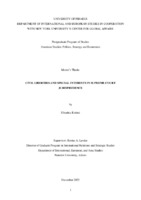Civil liberties and special interests in Supreme Court jurisprudence

View/
Keywords
Civil liberties ; Supreme Court ; Special interestsAbstract
In 1973, the Warren Court issued the landmark Roe v. Wade decision and established the constitutional protection of a woman’s right to choose to have an abortion, anchoring it in the Fourteenth Amendment’s right of privacy that the Court had first extracted a decade earlier. The decision reaffirmed the principle of equality and followed a series of previous decisions that had solidified the Supreme Court’s role as a safe keeper of individual rights.
Almost 50 years later, the Roberts Court overturned Roe on the principal argument that abortion is not deeply rooted in the Nation’s history and traditions, reversing a decades-long precedent that had become the law of the land and ensured the women’s equal participation in society. Although the Dobbs decision was met with an immediate public and political uproar, the ruling was indeed the culmination of a persistent effort to remove the constitutionality abortion and usher an era of further curtailment of equality rights.
This master’s thesis explores the parallel rise of the conservative movement and the religious right in the aftermath of Roe, their gradual infiltration in the legal academia and the federal judiciary; specifically, the conservative influence in Supreme Court appointments and its significance for debated civil liberties issues.
The thesis also examines the role of interest groups in political participation and the impact of the Citizens United decision in the formation of super PACs that have forever altered the political landscape and the special interests’ reach in the judiciary.
Finally, it addresses the organized interests’ diverse ways of influence in the Supreme Court, focusing mostly on the current composition of the Roberts Court and assessing its current reputational and institutional standing following a series of highly unpopular decisions that have sidelined equality rights in light of religious liberty claims.


